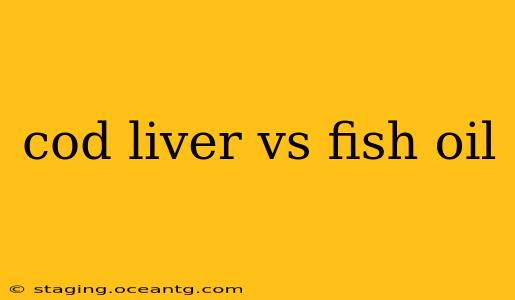Choosing between cod liver oil and fish oil can feel overwhelming. Both are rich in omega-3 fatty acids, crucial for heart health, brain function, and reducing inflammation, but they have key distinctions. Understanding these differences will help you make an informed choice about which supplement is right for you.
What are the Main Differences Between Cod Liver Oil and Fish Oil?
The primary difference lies in their source and composition. Fish oil is a generic term encompassing oils extracted from various fatty fish, such as anchovies, mackerel, and salmon. The extraction process typically focuses on obtaining omega-3 fatty acids, primarily EPA (eicosapentaenoic acid) and DHA (docosahexaenoic acid).
Cod liver oil, on the other hand, is specifically derived from the liver of cod fish. Besides EPA and DHA, it's also naturally rich in vitamins A and D. This makes it a more nutrient-dense option than standard fish oil supplements.
What are the Benefits of Cod Liver Oil?
Cod liver oil's higher vitamin A and D content offers significant advantages:
- Improved Vision: Vitamin A is crucial for maintaining good vision and preventing age-related macular degeneration.
- Stronger Bones: Vitamin D plays a vital role in calcium absorption, contributing to stronger bones and reducing the risk of osteoporosis.
- Immune System Support: Both vitamins A and D support a healthy immune system, making you less susceptible to infections.
- Reduced Inflammation: While both cod liver oil and fish oil offer anti-inflammatory benefits due to omega-3s, cod liver oil's additional nutrients can further enhance this effect.
What are the Benefits of Fish Oil?
Fish oil, while less nutrient-dense than cod liver oil, offers its own set of benefits primarily stemming from its omega-3 fatty acid content:
- Heart Health: EPA and DHA help lower triglycerides, blood pressure, and improve overall cardiovascular health.
- Brain Function: Omega-3s are essential for brain development and function, potentially reducing the risk of cognitive decline.
- Mental Well-being: Some studies suggest omega-3s may play a role in improving mood and reducing symptoms of depression and anxiety.
- Joint Health: Omega-3s can reduce inflammation in joints, potentially alleviating symptoms of arthritis.
Which is Better: Cod Liver Oil or Fish Oil?
There's no single "better" option; the best choice depends on individual needs and health goals.
-
Choose cod liver oil if: You're deficient in vitamins A and D, or you're looking for a supplement that offers broader nutritional support alongside omega-3s. However, be mindful of potential vitamin A toxicity with excessive consumption.
-
Choose fish oil if: Your primary goal is to increase your omega-3 intake, and you're already meeting your vitamin A and D requirements through diet or other supplements. Fish oil is generally more affordable than cod liver oil.
Is it safe to take Cod Liver Oil and Fish Oil together?
While it's generally safe to take both, it's crucial to monitor your intake of vitamins A and D to avoid exceeding the recommended daily allowances. Overconsumption of vitamin A can lead to toxicity, so consult your doctor before combining supplements or if you have pre-existing health conditions.
What are the potential side effects of Cod Liver Oil and Fish Oil?
Both cod liver oil and fish oil can cause side effects, though they are relatively rare. These may include:
- Fishy burps or aftertaste: This is common and often subsides with continued use.
- Digestive upset: Some individuals experience nausea, diarrhea, or heartburn.
- Increased bleeding risk: Omega-3s can increase the risk of bleeding, especially when combined with blood-thinning medications. Consult your doctor if you're on blood thinners.
- Vitamin A toxicity (cod liver oil): Excessive intake of vitamin A can lead to various health problems.
How much Cod Liver Oil or Fish Oil should I take?
Dosage varies depending on individual needs and the product's concentration. Always follow the manufacturer's instructions and consult your doctor or a registered dietitian for personalized recommendations. They can help determine the appropriate dosage based on your health status and goals.
This information is for general knowledge and does not constitute medical advice. Always consult with a healthcare professional before starting any new supplement regimen, especially if you have underlying health conditions or are taking medications.
